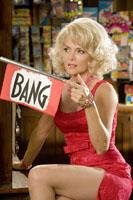Did I manage to mention that Adam Shankman's "Hairspray," made under the invaluable aegis of producers Neal Meron and Craig Zadan, is a movie musical?

Meron and Zadan have eased up to this triumphant moment with a handful of network TV musicals and, of course, finally revived the musical on screen big time with the Oscar-winning "Chicago" (2002), directed by Rob Marshall. An aside: Baz Lurhmann's "Moulin Rouge" (2001) doesn't count. As wonderful as it is, it is too much of an abberation, and along with Bob Fosse's "Cabaret" (1972), something of an anti-musical.
Still, as fine and divine as "Chicago" is, it is surpassed by "Hairspray," if only because "Hairspray" is not the least bit timid or ashamed of being a musical. Bill Condon, who adapted "Chicago" for the screen, as well as the recent "Dreamgirls" (2006), has perfected the knack for backing into his material's musical numbers. In "Chicago," he made singing on screen acceptable by conceiving the numbers as fantasy moments; in "Dreamgirls," the songs are performed either on stage or in a recording studio or dressing room, thereby making them more appropriate for people who are embarrassed by musicals.
Hollywood lost its way when it attempted to make film musicals for people who don't like film musicals. It was futile because these audiences would balk no matter how cautiously on-screen singing was presented. In the meantime, the studios alienated those fans who do like musicals.
With "Hairspray," it found its way back and, for once, gets it right. The people who made this film instinctively know that the best way to introduce a song on screen is to jump right into it. And that's what "Hairspray" does, it immediately opens with the big production number, "Good Morning, Baltimore!" It wastes no time. No timid tiptoing here: It grabs you by the collar and dares you not to have fun.
Shankman's accomplished direction (and, for that matter, his choreography) has raised a few eyebrows, with most critics citing his unwatchable previous film, "Cheaper by the Dozen 2" (2005). What they conveniently overlook is the fact that Shankman also directed "The Wedding Planner" (2001), a tidy, appealing little comedy that actually moved like a musical - a musical without songs, so to speak.

His exultant choreography here, which is virtually non-stop, is equalled by his assured direction. It speaks well of Shankeman's ability that there is not one weak performance in "Hairspray." Everyone shines - newcomers Nikki Blonsky, Zak Efron and Elijah Kelly, veterans Michelle Pfeiffer, Queen Latifah, Christopher Walken and Allison Janney and familiar faces James Marsden and Amanda Bynes, both of whom prove to be revelations here. This film has been wonderfully, adventurously cast, which is not something you could say about the film versions of either "The Producers" (2005) and "Phantom of the Opera" (2004).

And then there is John Travolta in the cross-dressing role of Edna, the mother of the film's young heroine. Travolta's game turn here has been the film's one point of controversy and has also been identified in some quarters as the movie's only weak link. That's because Travolta doesn't really play the role in drag, even though he's been made up as a woman. This Edna is not a broad charicature, a la Divine who played in the original John Waters 1988 movie, or Harvey Fierstein, who played the role on stage.
Travolta attempts to humanize the character, bring a sad poignancy and sweetness to Edna. A.O. Scott put it best in his review of the film in The New York Times when he wrote that Travolta's is "the most realistic, least stereotypical character in the film."
Unlike Nathan Lane and Matthew Broderick whose staleness was mangified by the film version of "The Producers," Travolta brings a newness, a sense of wide-eyed discovery to "Hairspray." And thank you to Adam Shankman, Craiz Zadan and Neal Meron for supporting this most wonderful experiment. It works.

And a word about Pfeiffer: Is it me or is she channeling Constance Towers, circa 1963, in "Hairspray"? Everytime she came on screen, impure thoughts of "The Naked Kiss" invaded my mind.
Note in Passing: There were several references to the Styne-Sondheim musical, "Gypsy," in the stage version of "Hairspray." But only one is retrain in the film version. During "Welcome to the Sixties!," Travolta sings, "Momma's gotta let go," a direct quote from "Rose's Turn."
But missing from Leslie Dixon's otherwise fine adapation of the Thomas Meehan-Mark O'Donnell book for the stage musical are two rather witty references to "Gypsy." There was a point on stage when Fierstein, playing Edna, shouts, "For me, For Me, FOR ME!," which of course closes the song, "Rose's Turn."
Also, when Prudy Pingleton sees her daughter all sexed-up for the dance contest and disapproves, Penny declares, "I'm a pretty girl, Momma," a line immortalized by Natalie Wood in the 1962 version of "Gypsy."
Great stuff and, given that Meron and Zadan are "Gypsy" devotees, the deletions surprised me.
(Artwork: Poster art from "Hairspray"; Travolta, dancing it up with Blonsky and Walken in two production numbers from the film; film musical auteurs Neal Meron and Craig Zadan, and Pfeiffer channeling ... Constance Towers)
* * *
Anyone interested in perusing some 2060 of my film reviews, dating back to 1994, can do so by simply going to RottenTomatoes.Com
No comments:
Post a Comment